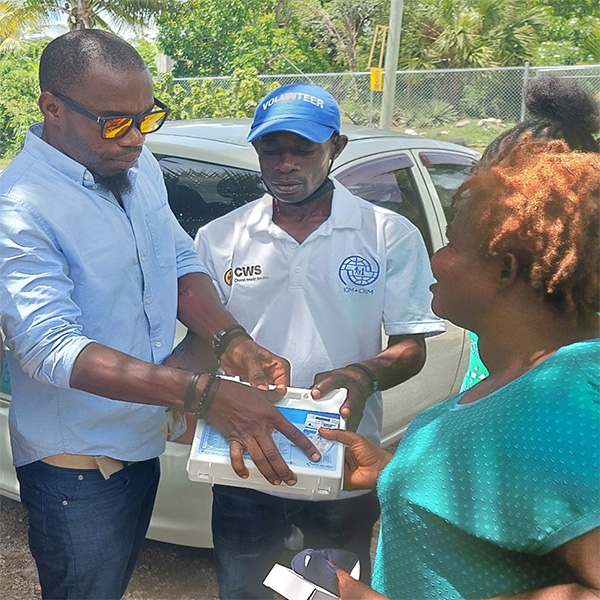Stories of Change

Volunteers show community members the elements of a First Aid kit. Photo courtesy of IOM Bahamas.
Haitian Migrant Communities in The Bahamas Focus on Disaster Preparedness
When disaster strikes, people who live in poor neighborhoods often suffer the most. Homes in these communities are often built with low-quality supplies. Hurricanes, for example, are more likely to damage or destroy them. If that happens, their residents have a harder time paying for repairs. Sometimes garbage services sometimes don’t reach informal settlements. Trash builds up in public areas, including big items like refrigerators. This is a health hazard on the best day; during a disaster, it can be deadly.
Now add migration to the mix. People who are living without documentation are even more vulnerable. They are less likely to trust authorities or ask for help after a disaster. They may not speak the primary language in the country where they live, which makes it much harder to get help or access relief services. Often, people are afraid to speak up, especially if they live in a society that continually pushes them to the margins.
This is what happened when Hurricane Dorian hit The Bahamas in 2019. Many Haitian migrants or people of Haitian descent live in The Bahamas. They are much more likely than their Bahamian neighbors to be up against the factors that we’ve talked about: poor living conditions, discrimination, fewer resources. When Dorian hit, these Haitian communities were among the people who suffered the most. That’s why CWS has partnered with the International Organization for Migration and several community-based organizations to focus our response on Haitian migrants.
Phase I of our recovery focused on helping more than fifty people recover documents needed to regularize their status. We also focused on ensuring that Haitian migrant communities were included in larger relief efforts. Starting in October 2020, we shifted to Phase II. During this phase, we started to look ahead to future disasters. Our goal was to help Haitian migrant communities be more resilient when the next storm comes.
We teamed up with four community-based organizations that work with Haitian migrants living in informal settlements. More than 40 volunteers from these organizations joined a series of training sessions. With each one, they gained skills and expertise to share with eight communities with more than 800 families. Training sessions focused on:
– Community mapping: identifying hazards and choosing supply locations and evacuation routes
– Drafting emergency plans
– First Aid, including CPR: each volunteer received a two-year first aid certification card
– Mental health and counseling
– Preventing violence against women and girls, which usually spikes in situations of extreme stress, like after a disaster
– Fire safety and prevention
– How to include migrants in disaster risk management
We also distributed critical supplies that will come in handy during a disaster. These included battery-powered radios, portable phone chargers, fire extinguishers, generators and First Aid kits.
Now, dozens of people are equipped to lead their communities in the face of disaster. They are already at work holding information sessions in their neighborhoods. They are handing out flyers and creating emergency plans. Some worked with the community-based organizations to secure contracts with garbage removal services. Then they organized a massive community clean-up initiative.
“Two great things I learned were CPR and disaster training,” one volunteer told us. “I learned how to prepare for a disaster, how I can help my family and the whole community prepare…the thing I enjoyed most was the CPR–I learned how to save someone else’s life.”
“I enjoyed the course on disaster management because it was so informative and practical,” said another volunteer. A third promised, “I will use what I have learned to better my life and the lives of those around me.”
All said, more than 900 people have participated in this program. We are grateful to the Evangelical Lutheran Church in America for their support of this work.
